Written By: Kerry Roberts
Crazy chicken lady here! In my last article, I covered the basics of getting started with chickens. I’m going to shift gears to ducks this time around. While many of the same points apply, such as checking your local zoning laws, there are some differences to consider before jumping into duck keeping.
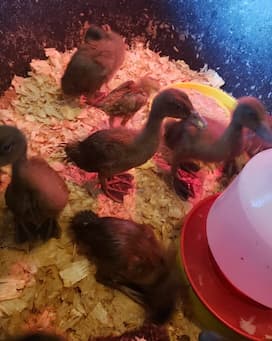
Research
First things first: research duck breeds to find the right one for you. Like chickens, some are better for meat, and some are better egg layers. We decided on Khaki Campbells due to their rockstar egg layer reputation. Duck eggs are more nutritious than chicken eggs and great for baking. (I love to bake!) It really seemed like a no-brainer. My four Khaki Campbell hens lay one egg per day, each. That gives us a whopping 28 eggs in just one week! They have definitely proven the rockstar egg layer rumors to be true.
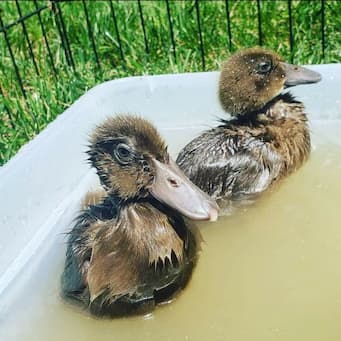
I’m going to get real with you here: ducks are filthy, stinky creatures. If you have a weak stomach, I would advise against duck keeping. I promise I’m not just being a drama queen! I have four children and have changed many-a-diaper, and I literally gagged cleaning the ducklings’ brooder. Ducks love water. They can’t resist splashing around in their water dish, flinging water absolutely everywhere. This leads to soggy bedding mixed with duck poop, under a heat lamp–not a great smell. Brace yourself for a lot of cleaning until they graduate to the back yard.
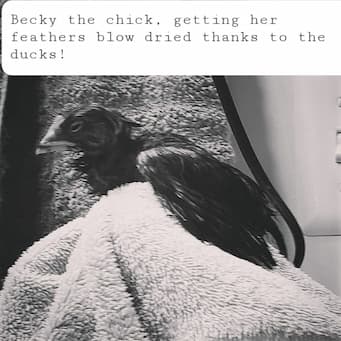
Brooders
If you are raising both chicks and ducklings, I highly suggest keeping them in separate brooders. I tried to keep mine together, thinking they’d get along better in the future that way. I immediately came to regret that decision.
A couple chicks got caught in the crossfire of a duck splash fest. Chicks cannot be wet, as it will lower their body temperature and potentially kill them. I had to wrap the poor drenched chicks in towels and dry them with a hair dryer! Needless to say, they moved out of the ducks water park and into their own dry brooder after that. Separating them did not seem to cause any issues later on, as they now share a coop at night and coexist beautifully.
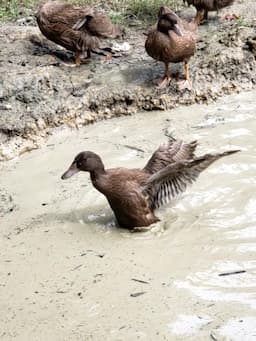
Water
This brings me to my next point: Ducks absolutely need water, and not just for drinking. They require access to water that is deep enough to submerge their bills in. This is how ducks clean their nostrils to prevent them from clogging.
We bought a gallon bucket at Tractor Supply for this very purpose; we have dubbed it the “duck-it bucket.” In true duck fashion, they turn it into a bucket of mud by day’s end. While most breeds don’t need a pond or their own kiddie pool, I would recommend it if it’s feasible. They are so happy when they have water to play in! My husband dug a small pond for our khakis with the tractor and they love it so much they try to sleep in it!

Feeding Ducks
As for their diet, I raised my ducklings on the same feed as my chicks: unmedicated chick starter crumbles. Ducklings need extra niacin in their diet. Their little legs won’t develop properly without it. You can order powdered brewer’s yeast on Amazon and sprinkle it on their food daily to make sure they’re getting it. Brewer’s yeast is totally safe for chicks as well, but they don’t require it like ducklings do. Simply switch them to layer feed when they are old enough, around 4-5 months.
Ducks also love treats! Grapes cut in half, lettuce, peas, and oats are favorites around here. The chickens tend to hog the treats, so I like to toss them in the pond so the ducks have first dibs once in a while.
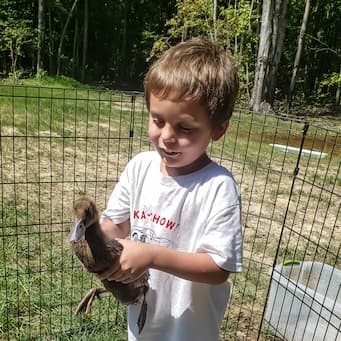
Mating
Last but not least, let’s discuss drakes. I’ll keep this as PG as I can, so bear with me. You’ll need to keep an eye on them to see how many males and females you end up with. It’ll take a few months, but you can tell them apart by the drake’s signature tail feather curl and in some breeds, the coloring.
Duck mating is serious business; there is a drake to hen ratio that must be maintained to avoid disaster. Each drake needs 4-5 hens to be happy. If this ratio is off, the drakes will fight each other over the hens, hurt the hens, or even go after the chickens. It can get violent and even deadly. If you end up with too many drakes, you will need to separate or rehome them.

Conclusion…
All in all, ducks are a great addition to our homestead. We live in the woods with lots of ticks and bugs, so their foraging skills are much appreciated! Not to mention, they are hilariously entertaining! They play in the rain like unsupervised children at a water park. They are skittish, but so sweet.
Every afternoon around 1 p.m., they take a nap in the backyard. My youngest runs to the door every day to watch them, and excitedly announce “they’re snuggling!” At sunset, they take one last dip in the pond before they waddle back to the coop for bed, in an adorable little row. (They are better at going to bed than our children are!) Hopefully this gives you an idea of what you’re in for when you bring those fluffy ducklings home from the feed store… because you know you want to!



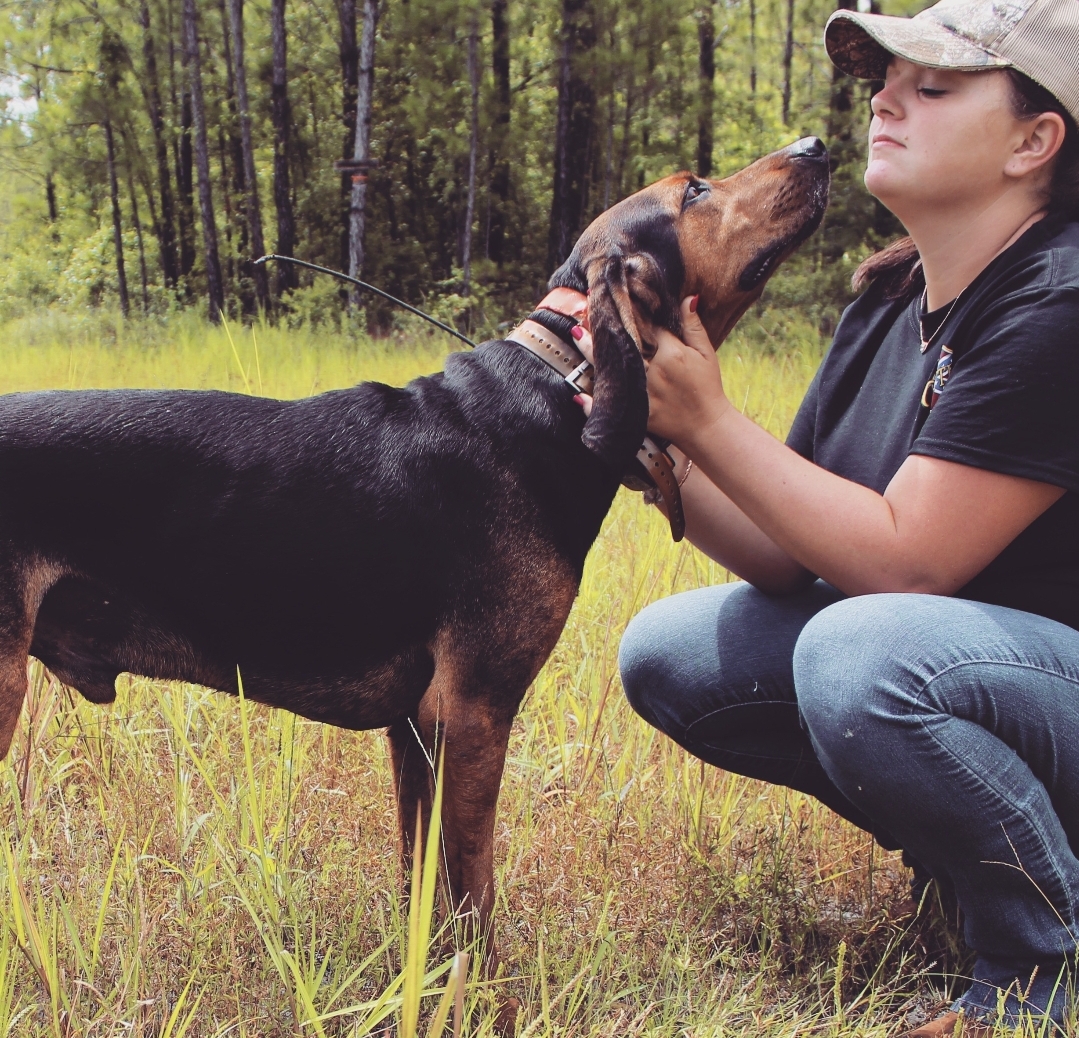

Thanks on your marvelous posting! I definitely enjoyed reading it, you might be a great author.I will be sure to bookmark your
blog and may come back later on. I want to encourage you continue your great writing,
have a nice holiday weekend!
Hello! Would you mind if I share your blog with my facebook group?
There’s a lot of people that I think would really appreciate your
content. Please let me know. Thanks
Pretty portion of content. I just stumbled upon your site and in accession capital to assert that I get actually enjoyed account your weblog posts.
Any way I’ll be subscribing for your augment or even I success you
get entry to constantly rapidly.